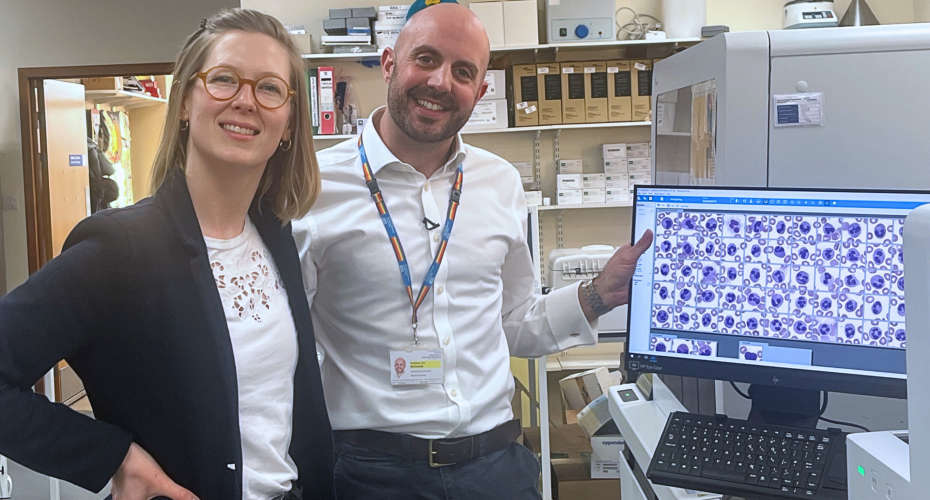
The Royal Devon is the first NHS Trust to integrate ground-breaking research into clinical practice, which could lead to thousands of people with cancer receiving an earlier diagnosis.
The Royal Devon is the first NHS Trust to integrate ground-breaking research into clinical practice, which could lead to thousands of people with cancer receiving an earlier diagnosis.
Led by scientists at the University of Exeter, the Help Flag clinical research study has identified a new way of interpreting standard blood tests that could lead to earlier detection of cancer and better outcomes for patients.
The Trust is the first to apply this new algorithm to routine blood analysis, which will help doctors detect differences in raised blood platelet levels in a more tailored way, flagging any concerns to GPs to investigate. The initiative will also give GPs more information about when this should be taken as a warning sign, and practical advice for next steps such as further tests.
The Royal Devon processes around 500,000 blood tests each year that include a platelet reading. Platelets are tiny blood cells that help the body form clots to stop bleeding. Blood tests already include a platelet count as standard, and a raised platelet count can be an early sign of certain types of cancers such as bowel or lung cancer.
Levels of platelets vary depending on age, and whether a person is male or female. However, this variation is currently not considered when doctors are interpreting platelet count results and deciding whether they might indicate cancer.
Initially, the new analysis will be piloted on tests from five practices or medical centres in the Exeter and East Devon area and is expected to run for two years, including a staged expansion in specific regions. If rolled out across the NHS, experts believe it could flag 10,000 patients a year who have a raised blood platelet count before their cancer diagnosis.
Professor Sarah Bailey, Associate Professor of Primary Care Diagnostics at the University of Exeter, led the study. She said:
“General practitioners know that a raised platelet count can be an early sign of cancer. This study will give them more information about when this should be taken as a warning sign, and how to act on it. This study paves the way for more tailored interpretation alongside practical advice for GPs about next steps. We’re delighted to see it in action in Devon already, and we hope to see it rolled out even further, to benefit patients and potentially save lives.”
Professor Tim McDonald, Clinical Director for Pathology at the Blood Sciences Laboratories at the Royal Devon University Healthcare NHS Foundation Trust, said:
“This research really is a win-win for improving cancer diagnosis. It’s actually very simple for us to add to the routine tests we’re already conducting, and we hope it will mean that GPs can catch cancer in some patients earlier, which we know leads to the best outcomes.”

 Take Pride in Exeter this weekend
Take Pride in Exeter this weekend
 3D lasers offer fascinating peek into Exeter’s underground history
3D lasers offer fascinating peek into Exeter’s underground history
 Events have taken place in Exeter to mark the 80th anniversary of VE Day
Events have taken place in Exeter to mark the 80th anniversary of VE Day
 Investigation launched into double death, Exmouth
Investigation launched into double death, Exmouth
 Exmouth man jailed for drug offences
Exmouth man jailed for drug offences
 Exmouth Sixth Form Eyes Kick-Off for New Football Academy
Exmouth Sixth Form Eyes Kick-Off for New Football Academy
 Discover remarkable stories of life on Devon’s coast through new interactive art trail
Discover remarkable stories of life on Devon’s coast through new interactive art trail
 Tribute paid following fatal collision, Otterton
Tribute paid following fatal collision, Otterton











